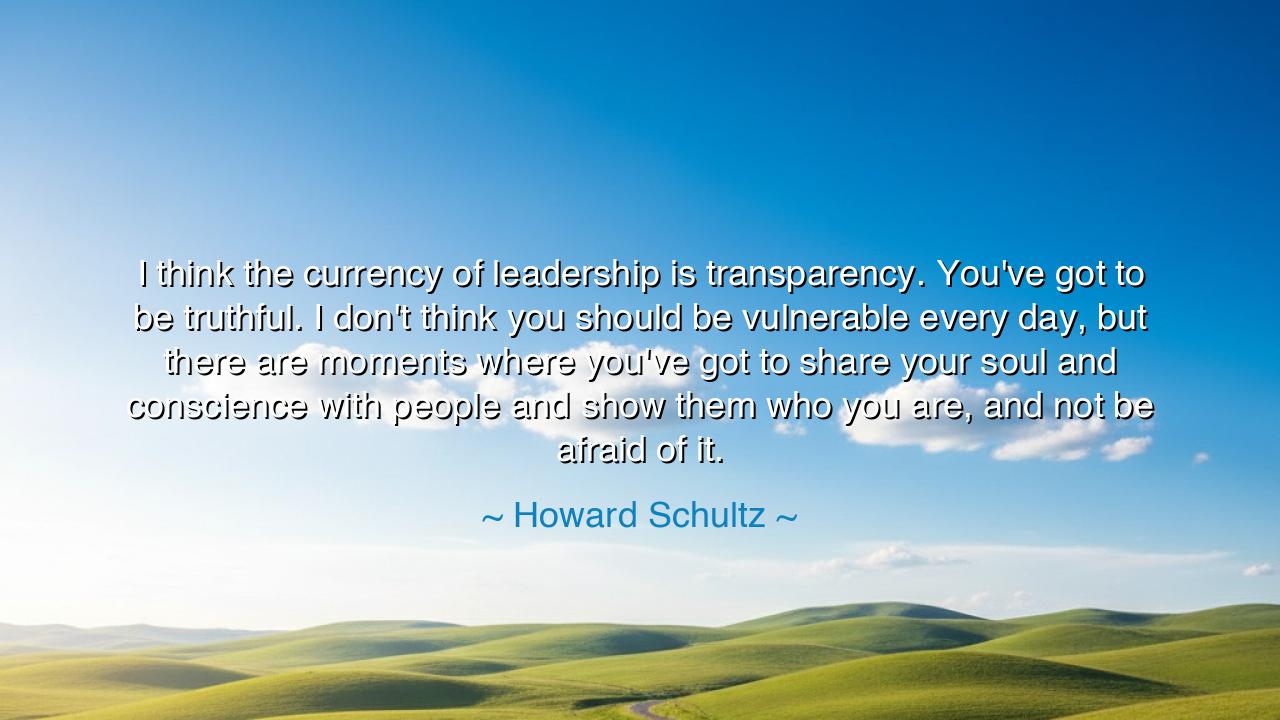
I think the currency of leadership is transparency. You've got to
I think the currency of leadership is transparency. You've got to be truthful. I don't think you should be vulnerable every day, but there are moments where you've got to share your soul and conscience with people and show them who you are, and not be afraid of it.






Hear, O seekers of wisdom, the words of Howard Schultz, who spoke not as a merchant of goods, but as a steward of souls: “I think the currency of leadership is transparency. You’ve got to be truthful. I don’t think you should be vulnerable every day, but there are moments where you’ve got to share your soul and conscience with people and show them who you are, and not be afraid of it.” This is no idle counsel, but a principle as old as the mountains and as fresh as the dawn. For leadership is not merely command, nor power, nor wealth; it is the trust of men and women who look to another for guidance. And trust cannot be purchased with gold—it is bought with the coin of truth.
What is this transparency, which Schultz calls the currency of leadership? It is the clear window of the heart, unclouded by deceit, unshaded by pride. A leader who hides behind masks may seem strong for a season, but in time the mask crumbles, and those who once followed turn away in bitterness. Yet the leader who speaks with honesty, even when the truth is hard, earns loyalty deeper than fear could ever command. Transparency is not weakness, but light; and those who walk in its glow will find others willing to walk beside them, even into storms.
And what is truthfulness? It is the bedrock of all noble command. A lie may build a throne, but it builds it on sand. When the waves rise, it collapses. Truth builds upon rock, and though winds howl and waters rage, the structure stands. A leader who speaks truth becomes like a lighthouse: steady, unshaken, guiding others safely to shore. This is why Schultz warns that leadership requires truth—not every secret laid bare, not every weakness confessed, but enough honesty to show the soul of the leader, so that people know they follow not a shadow, but a man or woman of flesh, conscience, and heart.
Consider the tale of Abraham Lincoln, who bore the great burden of the American Civil War. He did not shield his people from the pain of their division. In speeches and letters, he revealed his sorrow, his doubts, and his enduring hope for unity. He was not endlessly vulnerable, but at decisive moments he laid bare his conscience. When he spoke of “the better angels of our nature,” he was not posturing, but sharing his soul. This transparency did not weaken his authority—it made him beloved. His people saw him not as a distant ruler, but as a man who bore their grief and shared their dream. Thus his leadership endured, even beyond his death, because it was anchored in truth.
So too, we may look to the ancient figure of Marcus Aurelius, the philosopher-emperor of Rome. In his Meditations, which he never meant for the public, he confessed his struggles, his temptations, his weariness with power. Yet by this record we see the transparency of a leader who sought wisdom above pride. He did not share his soul daily with the multitudes, but he did so in measure, revealing enough of himself that his people knew he was not a tyrant, but a servant of Rome’s greater good. His strength was magnified by his honesty, for it showed that even the emperor was bound to conscience.
The lesson, children of the future, is clear: leadership without transparency is tyranny in disguise. A leader must be strong, yes, but not made of stone. There must be moments when the veil is lifted, when the soul is revealed. These are the moments when loyalty is forged not in fear, but in love and respect. To lead is to share not only the victories but also the burdens, to stand before others not as an idol, but as a human being who dares to speak truth.
Therefore, let your actions be guided thus: if you are called to lead, be truthful in your words, transparent in your heart, and courageous in showing your soul at the right moments. Do not flood the world with every doubt, but choose the times when revealing your conscience will strengthen the bond between you and those you guide. Let your honesty be like a well-timed flame, casting light where shadows might breed suspicion. In this way, your leadership will not rest upon fear or illusion, but upon trust that endures through hardship.
Take this as your practice: in your family, in your work, in your circle of companions, do not hide behind masks forever. Speak truth when it matters most, show your heart when courage demands it, and never fear to be known. For in being known, you will be followed. In being truthful, you will be trusted. And in being transparent, your leadership will not only guide others—it will inspire them to become leaders themselves.






AAdministratorAdministrator
Welcome, honored guests. Please leave a comment, we will respond soon